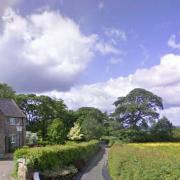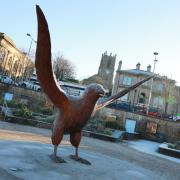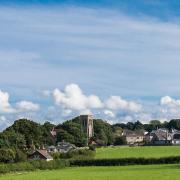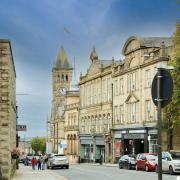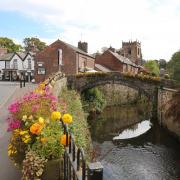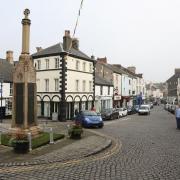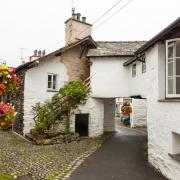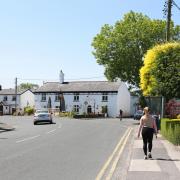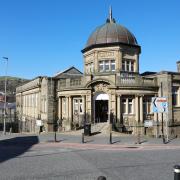This proud Lancashire town is shaking off the impact of recession and looking forward to a brighter future, writes Angela Kelly

BOLTON grew into one of the most important towns of the Industrial Revolution almost by chance. If Flemish weavers fleeing repression during the 17th century had not been encouraged to settle among the farmers of Lancashire – where the damp weather conditions suited their trade – the town would not have become such an important textile area.
When the tiny settlement grew and thrived, even though scarred by Civil War, it was another Boltonian, Samuel Crompton, whose clever spinning machine provided a stepping stone into the Industrial Revolution.
Chance has obviously played a major part in Bolton’s burgeoning history. But, fast forward to 2018, and it is not chance but development that is likely to drag the town away from the effects of recession and into a more positive era.
For although Bolton, like many towns up and down the country, has undoubtedly suffered from the global financial crisis, it is now the subject of ambitious plans. These involve £1 billion of investment, mostly from private developers, which could transform it into a town fit for the Millennium and way beyond.

The town has borrowed £100 million as its contribution to this ultimate facelift but Stephen Young, who has the title director of place and is a driving force behind the development, explained it had not been difficult to sell the idea to investors.
‘Even without the council’s investment, developers were happy to come on board. They can see the potential and want to invest in Bolton,’ he said.
Overall, the masterplan proposes to create 1,800 new homes, 7,400 new jobs and generate economic activity worth an additional £412 million. Although the plans are phased over more than a decade, change has already begun.
The town’s new £49 million transport interchange brings together bus and rail traffic. The imposing modern transport hub at the top of Newport Street and Trinity Street is the largest of its kind in Greater Manchester, incorporating the railway station and replacing the old Moor Lane bus station.

The overall development plan is designed to give the town centre a more concentrated retail core and to bring empty and brownfield sites back into use as housing. It will see the major gateways to the town, some of which are littered with empty buildings, transformed.
The plan hinges on five central areas including the Trinity Quarter close to the new interchange which will have a multi-storey car park, offices, housing and hotels.
One of the key elements of the plan is the Church Wharf development – a bold project involving hundreds of new homes in an area running along the River Croal between River Street and Bank Street. As Stephen Young explains: ‘We wanted to get more people back living in the town centre but we had to have the leisure facilities and infrastructure first.’
He believes Church Wharf will be a great place to live. ‘Would I live here? Yes, I would. Church Wharf would be a lovely place to live near to the water with walkways – a real community.’

Interestingly, there’s also a nod to history with the reintroduction of Water Street. The town map of 1851 shows it lined with weavers’ cottages going right down to the river. Although it later disappeared, it will resume its original role in the new development.
Croal Valley is another residential development of flats and townhouses offering a riverfront residential enclave south of Bark Street.
Elsewhere, Cheadle Square at the rear of the sweeping Georgian splendour of Le Mans Crescent, is where the University of Bolton wants to build student housing. There are also plans for a pedestrian route connecting the town hall with Queens Park.
The town centre’s retail and leisure offer has already been hugely enhanced by the development of The Vaults below its historic Market Hall, now re-named The Market Place. This has become a successful social hub with restaurant chains and bars and above it there is a new cinema, The Light.
The central retail scene is designed around retaining flagship stores like Primark and Marks & Spencer. Crompton Place shopping centre is to be revamped and will include new restaurants overlooking Victoria Square.
Understandably, many people in Bolton remain sceptical about the future but investment is already showing – in Council-created projects but also in private developments like The Link shopping and leisure centre emerging on Bow Street and the renovation of Little Bolton Town Hall into a restaurant, bar and offices.
In Bolton’s business world, the new plans offer a boost of confidence. David Ramsden from thebestofbolton, the marketing and support organisation representing 120 local businesses, said: ‘We started our business in 2010 when Bolton wasn’t exactly in its finest hour. The country was deep in recession and businesses “battening down the hatches” was a familiar phrase. Survival was the aim.
‘Since then, and particularly in the last two years as projects and developments have completed and the vision for Bolton has become clearer, we’ve seen an upturn in business confidence. It’s apparent that the town will once again become a major force in the region’s economy and an appropriate home for proud local businesses.’
Chris Houghton is the chief executive of Eventura, an international systems management company specialising in cyber security. Bolton-born, he maintains a fierce pride in his town.
‘A range of diversity in culture, needs and businesses means that there are opportunities for all,’ he said. ‘In this digital age, new start-ups of all kinds are able to compete with established brands. All that is needed is a good idea, great customer service and a stable internet line. So why not in Bolton?’
As Stephen Young added: ‘The Northern Powerhouse is still flying – and Bolton is flying with it.’
Tribute to Alfie’s creator
The Bolton writer who created an iconic character of the 1960s is set to be celebrated in his home town. The Heritage Lottery Fund has granted £40,000 to community arts organisation Live from Worktown to provide a wide-ranging programme of events about acclaimed writer Bill Naughton.
Today, Bill is largely neglected but his scripts for Alfie, Spring and Port Wine and The Family Way were considered classics of British cinema. An exhibition based on his life will tour community centres, schools, and clubs. There will also be guided walks of Naughton’s neighbourhood, a DVD of memories from his contemporaries and there will be a Bill Naughton biography.
Bolton Central Library will open up the extensive archive of notebooks, drafts, diaries and memorabilia bequeathed on the death of his widow in 2014. In addition, performances are planned of some of his short stories, together with a gala showing of Spring and Port Wine, which was filmed in the town, at Bolton Little Theatre






